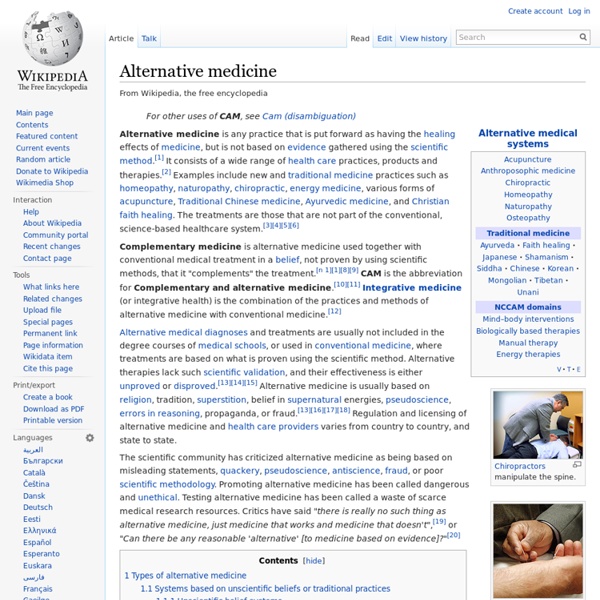Alternative medicine

Phytotherapy
Running total of the number of research papers listed on PubMed from 1990-2007 containing the word "phytotherapy."[original research?] Phytotherapy is the study of the use of extracts of natural origin as medicines or health-promoting agents. Phytotherapy is distinct from homeopathy and anthroposophic medicine, and avoids mixing plant and synthetic bioactive substances. Modern phytotherapy, following the scientific method, can be considered the study on the effects and clinical use of herbal medicines. Clinical tests[edit] The bark of the cinchona tree contains quinine, which today is a widely prescribed treatment for malaria, especially in countries that cannot afford to purchase the more expensive anti-malarial drugs produced by the pharmaceutical industry. Many herbs have shown positive results in-vitro, animal model or small-scale clinical tests,[1] while studies on some herbal treatments have found negative results.[2] In 2002, the U.S. Points to consider in phytotherapy[edit]
Moringa oleifera
"Drumstick tree" and variants thereof redirect here. This name is also used for the golden shower tree (Cassia fistulosa) Moringa oleifera is the most widely cultivated species of the genus Moringa, which is the only genus in the family Moringaceae. Etymology[edit] Moringa derives from the Tamil word, murungai or Malayalam word, murinna (alternately muringa).[3] Numerous other common names for moringa exist in different languages worldwide.[3][4] Description[edit] Tree and seed pods of Moringa oleifera M. oleifera is a fast-growing, deciduous tree.[5] It can reach a height of 10–12 m (32-40 ft) [6] and the trunk can reach a diameter of 45 cm (1.5 ft).[7] The bark has a whitish-grey colour and is surrounded by thick cork. The flowers are fragrant and bisexual, surrounded by five unequal, thinly veined, yellowish-white petals. Flowering begins within the first six months after planting. Cultivation[edit] Production area[edit] Cultivation practice[edit] Soil preparations[edit] Propagation[edit]
This ancient Egyptian practice can cheaply purify dirty water
The seeds of the Moringa oleifera tree have been used to purify water and clean crockery since the days of ancient Egypt, but up until now scientists weren't sure exactly how they worked. Thanks to a new paper published in the journal Langmuir by researchers at Pennsylvania State University, part of the mystery has now been solved. It had already been established that a protein inside the Egyptian seeds caused bacteria to clump together in the water and die, sinking to the bottom of the container to leave the water largely clear. But the latest discovery reveals how this is done: the academics found that the seeds actually fuse the membranes of said bacteria together. As those membranes are the main protection the bacteria have, disrupting them causes the cells to die. That's not all though. These new breakthroughs are another step along the way to having this type of seed grown in areas where it is most needed, rather than just the areas where it occurs naturally.
Related:
Related:



